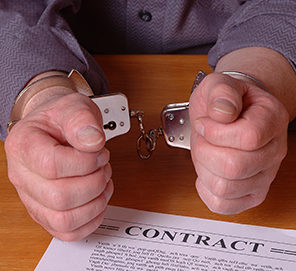Posted on April 07, 2014 by Jeffrey Feiler
 The law consists of three basic classifications of criminal offenses including infractions, misdemeanors, and felonies. Each criminal offense is differentiated by the severity of the crime committed which determines its classification. State legislatures and Congress assign the factors and behaviors for every criminal offense; therefore, the classification and penalties vary by state for each. Below is an analysis of classifications pertaining to the three main criminal offense charges and several examples of crimes that correspond to each case.
The law consists of three basic classifications of criminal offenses including infractions, misdemeanors, and felonies. Each criminal offense is differentiated by the severity of the crime committed which determines its classification. State legislatures and Congress assign the factors and behaviors for every criminal offense; therefore, the classification and penalties vary by state for each. Below is an analysis of classifications pertaining to the three main criminal offense charges and several examples of crimes that correspond to each case.Infraction
Also known as petty crimes, infractions consist of minor criminal offenses. Most infractions are punished by fines instead of jail time and do not require attendance in court. Infractions are classified as local crimes against traffic or noise violation laws. Although an infraction is considered to be a minor case, failure to resolve the penalty charges within the deadline could lead to greater consequences. For example, multiple points on a license could lead to license suspension or revocation. In addition, the accumulation of infractions could develop into a misdemeanor or possible jail time. Different infraction cases include:
- Running a stop sign
- Speeding while driving
- Violation of building codes
- Littering
- Disobeying seat belt laws
Misdemeanor charges are the median between infractions and felonies. The difference between a misdemeanor and a felony charge is the crime's level of severity. Every state has different levels of misdemeanors that are classified into four or five subcategories. Misdemeanors are organized by Class 1-Class 4 (Class A-Class D). Class 1 misdemeanors are the most severe, resulting in higher penalty charges. As the classifications increase the crime's level of severity and penalty charges decrease. Misdemeanor offenders are penalized by fines, community service, probation, court supervision, or a minimal jail sentence. Misdemeanor jail sentences are served in county or local jails and do not exceed one year. With the exception of a few states, misdemeanor offenders do not lose their civil rights. However, misdemeanor offenders may lose the opportunity to obtain certain employment. Misdemeanor offenses can include crimes against people, property, public order, or public safety. Examples of misdemeanors include:
- Simple assault
- Harassment
- Vandalism
- Trespassing
- Public Intoxication
Felonies are the highest level of criminal offenses involving the most severe penalties. Felony charges affect every member associated with committing the crime including the offender and their accomplices. An accomplice includes anyone who aided the offender before, during, and after the crime. Felony penalties are dependent on the crimes' level of severity and typically involves prison time. Felony prison sentences range from over a year to life without parole and in some cases execution. In addition, felony offenders lose their civil rights such as the right to own a firearm and in some cases the right to vote. Felonies are also difficult to expunge and will often remain on an individual's record permanently. Felonies are divided into violent and non-violent crimes and are classified into several categories. The most common forms of felonies include:
- Rape
- Murder
- Arson
- Drug abuse violations
- Aggravated assault
Whether an offender is facing felony or misdemeanor charges, hiring a strong and experienced Miami criminal defense attorney from the Feiler Law Firm will help decree a more desirable outcome. They can help offenders save invaluable time while avoiding the unnecessary costs associated with arrests and court.
Disclaimer: The names of all persons, including Police, have been changed to fictitious names in the case of blog posts about actual cases handled by Jeffrey Feiler and the Feiler Law Firm. The hiring of a lawyer is an important decision that should not be based solely upon advertisements. Before you decide, ask us to send you free written information about our qualifications and experience. This web site is designed for general information only. The information presented at this site should not be construed to be formal, legal advice nor the formation of a lawyer/client relationship.





